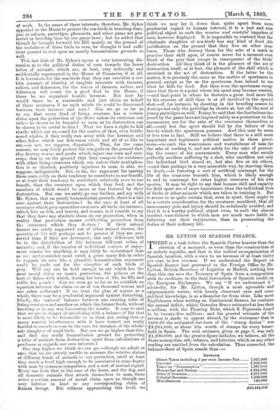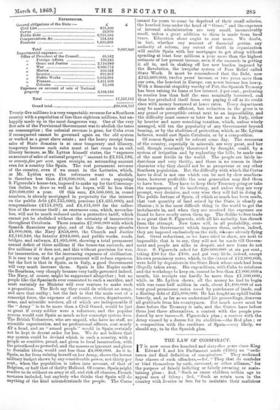MR. LYTTON ON SPANISH FINANCE.
THERE is a task before the Spanish Cortes heavier than the election of a monarch, or even than the construction of an orderly republic, and that is the radical re-organization of Spanish taxation, with a view to an increase of at least thirty per cent. in her revenue. If we understand the Report on Spanish finance just presented to the Foreign Office by Mr. Lytton, British Secretary of Legation at Madrid, nothing less than this can save the Treasury of Spain from a composition with its creditors, to the final destruction of Spanish credit on the European Exchanges. We say " If we understand it" advisedly, for Mr. Lytton, though a most agreeable and epigrammatic writer, with keenly observant eyes and some political knowledge, is as a financier far from clear. Like most Englishmen when writing on Continental finance, he confuses the annual deficit, which Gonzales Bravo estimated at less than a million, with the Floating Debt, which S. Figuerola found to be twenty-five millions ; and his general estimate of the revenue is made to appear absurd, by the statement that in 1868-69 the estimated out-turn of the " stamp duties " was £8,284,000, or about 50s. worth of stamps for every household in Spain. The real estimate, given at page 9, was only £1,200,000, and the greater figure includes, we believe, all the State monopolies, salt, tobacco, and lotteries, which on any other reading are omitted from the calculation. Thus corrected, the balance-sheet of Spain stands thus :—
REvEsus.
Direct Taxes including 5 per cent. Income-Tax 7,037,000 Customs 2,400,000 Taxes on " Consumption " 1,987,000 Monopolies and Stamps 8,284,000 Sales of Domains 4,257,000 Colonial Revenue 1,839,000 Miscellaneous 140,000
EXPENDITURE.
General obligations of the State :— Civil List 458,500 Cortes 23,970 Public Debt 6,735,583 Compensations, ic 154,282 Pensions 1,635,305 Total 9,007,640 Departmental expenses : office of President of the Council 68,842 „ Foreign Affairs 138,245 „ Grace and Justice 2,110,940 „ War 3,966,712 „ Marine 858,544 Interior 918,907 „ Public Works 1,893,991 „ Finance 4,451,609 „ Colonies 15,166 Expenses on account of sale of National property 3,134,186 Total 17,557,147 Grand total £26,564,787
Twenty-five millions is a very respectable revenue for a Southern country with a population of less than eighteen millions, but unhappily made up in the most dangerous way. One of the very first acts of the Provisional Government was to abolish the taxes on consumption ; the colonial revenue is gone, for Cuba even if reconquered cannot be governed again on the old system or worked as a great slave estate ; and the heavy receipt from sales of State domains is at once temporary and illusory, temporary because such sales must at last come to an end, illusory because, as Mr. Lytton himself states, the "expenses on account of sales of national property " amount to £3,134,186, or seventy-five per cent. upon receipts, an astounding amount even for a country like Spain. The real permanent revenue of the country, even if we count in the Lotteries, which, as Mr. Lytton says, the reformers want to abolish, is therefore less than £18,000,000, and even supposing S. Figuerola's house-tax, imposed to make up for the Consumption duties, to draw as well as he hopes, will be less than £20,000,000 a year. Of this sum, £8,500,000, in round numbers, is already mortgaged in perpetuity for the interest on the public debt (X6,735,000), pensions (£1,635,000), and compensations (£154,282), and £4,451,600 for the collection of the revenue itself ; an enormous sum, which, nevertheless, will not be much reduced under a protective tariff, which cannot yet be abolished without the certainty of insurrection throughout Catalonia. There remains £7.000,000 with which Spanish financiers may play, and of this the Army absorbs £4,000,000, the Navy £858,000, the Church and Justice £2,110,940, the Interior £918,000, and public works, roads, bridges, and railways, £1,893,000, showing a total permanent annual deficit of three millions if the house-tax succeeds, and five millions if it does not, and this without provision for war, for insurrection, or for the increasing expenses of civilization. It is easy to say that a good government will reduce expenses, but the fact is that in Spain, as in Italy, a good Government will very much increase them. Spain is like Naples under the Bourbons, very cheaply because very badly governed indeed. The Navy, of course, might be suppressed altogether ; but no people like the Spaniards ever consented to such a sacrifice, and most certainly no Minister will ever venture to make such a proposition. The Reds say they could do without an army, and save that outlay ; but the fact is that the main cost of a conscript force, the expenses of ordnance, stores, departments, arms, and scientific services, all of which are indispensable if the " Army " is to be more than a Civil Guard, would be just as great if every soldier were a volunteer, and the popular system would cost Spain as much as her conscript system does. The British Volunteers, who are unpaid, who have no staff, no scientific organization, and no professional officers, cost nearly £2 a head, and an " armed people " would in Spain certainly not be kept in decent order for less. We do not believe that any system could be devised which in such a country, with a people so sensitive, proud, and given to local insurrection, with the priesthood so powerful, and the masses so ignorant and given to Socialist ideas, would cost less than £4,000,000. As it is, Spain, so far from ruining herself on her Army, shows the lowest military budget shown by any considerable power, not thirty per cent., when the population is taken into account, of that of Belgium, or half that of thrifty Holland. Of course, Spain might resolve to do without an army at all, and risk all chances, French menaces included, but anybody who thinks that Spain will do anything of the kind misunderstands the people. The Curas
cannot for years to come be deprived of their small salaries, the heaviest item under the head of " Grace," and the expenses of internal administration are very small, inconceivably small, unless a great addition to them is made from local taxes. Education alone ought to cost more. We doubt, in fact, whether any amount of financial genius, any audacity of reform, any extent of thrift in organization will enable Spain with her mortgages to get along without spending at least four millions a year more than the highest estimate of her present income, even if she succeeds in getting it all in, and in shaking off her new burden imposed by the Revolution, the irregular system of Poor Relief called State Work. It must be remembered that the Debt, now £245,000,000, twelve years' income, or two years more than our own, the heaviest in Europe, can never become less heavy. With a financial stupidity worthy of Pitt, the Spanish Treasury has been raising its loans at low interest, 3 per cent., preferring to receive less than half the sum nominally borrowed, and thus has precluded itself from ever paying it off as its credit rises with money borrowed at lower rates. Every department may be made more efficient, but reduction in the gross is to any grand or perceptible extent next to an impossibility, and the difficulty must sooner or later be met as in Italy, either by heavier and more searching taxation, which, unless wisely managed, will tax the popularity of any Government beyond bearing, or by the abolition of protection, which, as Mr. Lytton believes, would cost Spain Catalonia, or by a composition.
Of course Spain will be solvent some day. The resources of the country, especially in minerals, are very great, and her soil, though constantly threatened by drought, could, by a system of irrigation and by replanting the hills, be made one of the most fertile in the world. The people are fairly industrious and very thrifty, and there is no reason in their character why they should not be as prosperous as any other Southern population. But the difficulty with which the Cortes have to deal is not one which can be met by slow ameliorations, however profitable the next generation may find them to have been. They have to keep their Treasury going or take the consequences of its insolvency, and unless they are very prompt, very decisive, and very wise they will fail in doing it. The public fortune of Spain, of which so much has been made, that vast quantity of land seized by the State, is clearly an illusion ; it is the most difficult thing in the world to get the instalments in, and when they are received the expenses are found to have nearly eaten them up. The dislike to free trade is so great that S. Figuerola, with all his audacity, has shrunk from the attempt. New taxes will, in all probability, overthrow the Government which imposes them, unless, indeed, they are imposed exclusively on the rich, wko are already flying fast. Great reductions, as we have tried to show, aro next to impossible, that is to say, they will not be made till Government and people are alike in despair, and new loans do not draw. S. Figuerola asked for £20,000,000 at six per cent., taking £80 for the £100, and got very little, indeed, except his own promissory notes, which, to the extent of £12,000,000, were held by depositors in the State Bank whose cash had been illegally taken away. His expenditure, with Cuba to reinforce and the workshops to keep on, cannot be less than £2,000,000 a month, his receipts can hardly be more than £1,500,000; while, as Mr. Lytton shows, all the money he had to begin with was some half million in cash, about £1,400,000 of not very good promissory notes owed by purchasers of lands, and a floating debt of £25,000,000. He has fought an uphill battle bravely, and, as far as we understand his proceedings, deserves all gratitude from his countrymen. But much more must be done before the Treasury is safe, and the Cortes have before them just three alternatives, a contest with the people produced by new taxes—S. Figuerola's plan ; a contest with the Army caused by a decree for its abolition—the Red plan ; or a composition with the creditors of Spain—very likely, we should say, to be the Spanish plan.



































 Previous page
Previous page